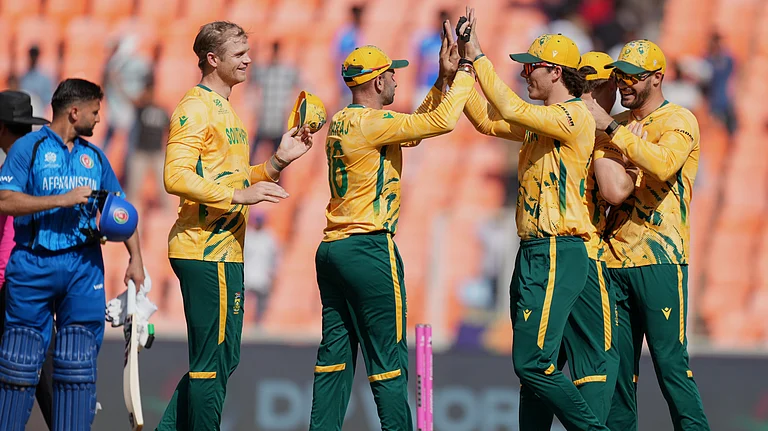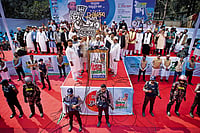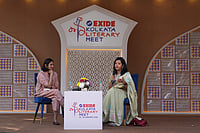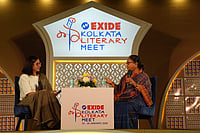When Mamata Banerjee’s Trinamool Congress (TMC) launched a poaching drive on Congress in different parts of the country – from Goa, Tripura and Meghalaya to Uttar Pradesh and Haryana – in the second half of last year, many political observers suspected it was actually a move mooted by political strategist Prashant Kishor, who was reportedly miffed at the Congress after his talks with its top leadership regarding joining the party did not fructify.
But those who knew Banerjee from close quarters for several years knew that it was not the case. She did not need a Kishor or any other external provocation to take on the Congress, and Rahul Gandhi in particular. She does not like Rahul Gandhi as a political leader and has never been in a mood to accept him as a leader of any coalition.
This became evident once more on Tuesday when Banerjee targeted Rahul and Priyanka Gandhi from her rally in Uttar Pradesh in support of the Samajwadi Party (SP), is seen as the main rival of the Bharatiya Janata Party (BJP) in the Uttar Pradesh state elections.
On Tuesday, she said, “They are like the birds who appear in the spring-like the cuckoo and the magpie-robin,” in an apparent reference to Rahul and Priyanka Gandhi, though without naming them.
“They come during the elections, divide the votes and return. After the elections, they idle at home for 5 years. Some stay in Delhi, some in Hyderabad, some keep travelling. They are election birds. Never waste your votes casting in their favour,” said the TMC chief.
The reference to Hyderabad is understandably a jibe at Asaduddion Owaisi’s All India Majlis Ittehad e Muslimeen (AIMIM), the Hyderabad-based party with a national aspiration that is also contesting in the UP state elections.
But “cuckoo”, “seasonal flower” and “birds of passage” are some of the adjectives Banerjee has been using on Rahul Gandhi since 2009-10.
“She does not consider Rahul Gandhi to be a serious politician, she does not respect his political acumen and she will not be comfortable in being part of any coalition with Rahul Gandhi as the leading figure. Her equations with Sonia Gandhi is a little different, she does respect her and has a working relation, but she just prefers to ignore Rahul,” said a veteran TMC leader who has known Banerjee for a long time.
Banerjee has not spared Sonia Gandhi altogether, even though the TMC was part of the Congress-led first UPA government between 2009 and 2012. In her 2012 memoir, later translated to English as ‘My Unforgettable Memories’, she has repeatedly referred to Gandhi as ‘queen mother’ while narrating the incident of Gandhi’s last-ditch attempt in 1997 to persuade Banerjee not to leave the Congress.
Since then, Banerjee’s own party has grown largely at the cost of Congress.
But for Rahul Gandhi, Banerjee has been consistently harsh. Even in 2010, when Banerjee was the railway minister in the second United Progressive Alliance (UPA) government led by the Congress, she had referred to Gandhi as ‘cuckoo’ and ‘seasonal flower’ following Gandhi’s back to back organizational trips to Bengal.
Last December, Banerjee launched a scathing attack on him, though without naming, saying that politics was a full-time occupation and staying “abroad half the time” did not match the commitment and involvement a politician required. She was obviously referring to Gandhi’s foreign trips on holidays.
Why did she target the Congress in Uttar Pradesh and speak of fielding her own party’s candidates in Uttar Pradesh in the 2024 Lok Sabha elections, while on a visit to the state to campaign for the SP? Is she not in UP to return the favour that the SP extended to her ahead of the Bengal assembly elections?
In early 2021, SP national vice-president Kiranmoy Nanda camped in East Midnapore district of West Bengal – the district he hails from and where he won an assembly seat seven times in a row since 1977 – for several days to campaign for Mamata Banerjee, who was contesting from Nandigram assembly seat in the district. Besides, SP Rajya Sabha MP Jaya Bachchan came to address public rallies for the TMC as Akhilesh Yadav’s representative.
So, why does she appear to look like on a mission to build her party’s footprint, rather than returning a political favour? She of, course, called for the victory of SP in the coming UP elections. But would her party’s sudden entry to the state not hamper the interests of the SP in the 2024 Lok Sabha elections?
A TMC Rajya Sabha MP, who spoke on condition of anonymity, tried to explain a complex formula. “Her approach makes it clear that in Uttar Pradesh, the party will be targeting places where the SP is weak, or the Congress is still the BJP’s primary opponent. The party will try to engineer more defections in the Congress in UP and Haryana,” said the MP.
According to veteran journalist Jayanta Ghosal, author of the recently-published book, Mamata: Beyond 2020, Banerjee’s UP tour is aimed at capitalising on the ‘anti-BJP brand equity’ that she has developed since ensuring her victory in the 2021 Bengal assembly elections.
“Even now, her focus is to consolidate her party in Bengal, where she would like to ensure about 40 out of the total 42 seats. But she wants to add to the tally from outside Bengal, too. For which, she is focused on working on brand value. Do not forget that brand values matter. In 1989, VP Singh did not have organisational strength at the national level but he had the image of being the tallest figure among opposition leaders,” Ghosal said.
He feels that the SP has been in a conflicting relationship with the Congress helped Banerjee’s equations in targeting the Congress. “This does not mean she will not tie-up with Congress in future. It only shows that she wants to increase her bargaining power before her party has to enter any negotiation with the Congress in future,” Ghosal said.
Pshephologist Biswanath Chakraborty, a professor of political science at Rabindra Bharati University in Kolkata, said it was not possible to predict Banerjee’s moves. “It’s always difficult to predict the TMC’s political behaviours. Flexibility or inconsistency, by whichever name you call it, has been reflected in the past on numerous occasions, including in her relations with the UPA and regarding supporting Pranab Mukherjee in the Presidential election,” Chakraborty said.
He added that much of Banerjee’s plans regarding national footprint will depend on the outcome of the UP assembly elections.


























